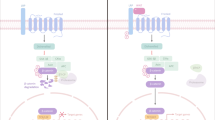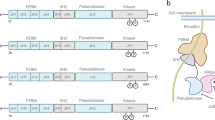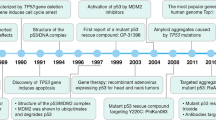Abstract
Cripto is a developmental oncoprotein that signals via mitogen-activated protein kinase (MAPK)/extracellular signal-regulated kinase (ERK), phosphatidylinositol 3-kinase (PI3K)/Akt and Smad2/3 pathways. However, the molecular basis for Cripto coupling to these pathways during embryogenesis and tumorigenesis is not fully understood. In this regard, we recently demonstrated that Cripto forms a cell surface complex with the HSP70 family member glucose-regulated protein-78 (GRP78). Here, we provide novel functional evidence demonstrating that cell surface GRP78 is a necessary mediator of Cripto signaling in human tumor, mammary epithelial and embryonic stem cells. We show that targeted disruption of the cell surface Cripto/GRP78 complex using shRNAs or GRP78 immunoneutralization precludes Cripto activation of MAPK/PI3K pathways and modulation of activin-A, activin-B, Nodal and transforming growth factor-β1 signaling. We further demonstrate that blockade of Cripto binding to cell surface GRP78 prevents Cripto from increasing cellular proliferation, downregulating E-Cadherin, decreasing cell adhesion and promoting pro-proliferative responses to activin-A and Nodal. Thus, disrupting the Cripto/GRP78 binding interface blocks oncogenic Cripto signaling and may have important therapeutic value in the treatment of cancer.
This is a preview of subscription content, access via your institution
Access options
Subscribe to this journal
Receive 50 print issues and online access
$259.00 per year
only $5.18 per issue
Buy this article
- Purchase on Springer Link
- Instant access to full article PDF
Prices may be subject to local taxes which are calculated during checkout






Similar content being viewed by others
References
Adewumi O, Aflatoonian B, Ahrlund-Richter L, Amit M, Andrews PW, Beighton G et al. (2007). Characterization of human embryonic stem cell lines by the International Stem Cell Initiative. Nat Biotechnol 25: 803–816.
Adkins HB, Bianco C, Schiffer SG, Rayhorn P, Zafari M, Cheung AE et al. (2003). Antibody blockade of the Cripto CFC domain suppresses tumor cell growth in vivo. J Clin Invest 112: 575–587.
Arap MA, Lahdenranta J, Mintz PJ, Hajitou A, Sarkis AS, Arap W et al. (2004). Cell surface expression of the stress response chaperone GRP78 enables tumor targeting by circulating ligands. Cancer Cell 6: 275–284.
Bianco C, Adkins HB, Wechselberger C, Seno M, Normanno N, De Luca A et al. (2002). Cripto-1 activates nodal- and ALK4-dependent and -independent signaling pathways in mammary epithelial cells. Mol Cell Biol 22: 2586–2597.
Bianco C, Kannan S, De Santis M, Seno M, Tang CK, Martinez-Lacaci I et al. (1999). Cripto-1 indirectly stimulates the tyrosine phosphorylation of erb B-4 through a novel receptor. J Biol Chem 274: 8624–8629.
Bianco C, Strizzi L, Rehman A, Normanno N, Wechselberger C, Sun Y et al. (2003). A Nodal- and ALK4-independent signaling pathway activated by Cripto-1 through Glypican-1 and c-Src. Cancer Res 63: 1192–1197.
Davidson DJ, Haskell C, Majest S, Kherzai A, Egan DA, Walter KA et al. (2005). Kringle 5 of human plasminogen induces apoptosis of endothelial and tumor cells through surface-expressed glucose-regulated protein 78. Cancer Res 65: 4663–4672.
Dong D, Ni M, Li J, Xiong S, Ye W, Virrey JJ et al. (2008). Critical role of the stress chaperone GRP78/BiP in tumor proliferation, survival, and tumor angiogenesis in transgene-induced mammary tumor development. Cancer Res 68: 498–505.
Fu Y, Wey S, Wang M, Ye R, Liao CP, Roy-Burman P et al. (2008). Pten null prostate tumorigenesis and AKT activation are blocked by targeted knockout of ER chaperone GRP78/BiP in prostate epithelium. Proc Natl Acad Sci USA 105: 19444–19449.
Gonzalez-Gronow M, Cuchacovich M, Llanos C, Urzua C, Gawdi G, Pizzo SV . (2006). Prostate cancer cell proliferation in vitro is modulated by antibodies against glucose-regulated protein 78 isolated from patient serum. Cancer Res 66: 11424–11431.
Gray PC, Greenwald J, Blount AL, Kunitake KS, Donaldson CJ, Choe S et al. (2000). Identification of a binding site on the type II activin receptor for activin and inhibin. J Biol Chem 275: 3206–3212.
Gray PC, Harrison CA, Vale W . (2003). Cripto forms a complex with activin and type II activin receptors and can block activin signaling. Proc Natl Acad Sci USA 100: 5193–5198.
Gray PC, Shani G, Aung K, Kelber J, Vale W . (2006). Cripto binds transforming growth factor beta (TGF-beta) and inhibits TGF-beta signaling. Mol Cell Biol 26: 9268–9278.
Harms PW, Chang C . (2003). Tomoregulin-1 (TMEFF1) inhibits nodal signaling through direct binding to the nodal coreceptor Cripto. Genes Dev 17: 2624–2629.
Harrison CA, Gray PC, Fischer WH, Donaldson C, Choe S, Vale W . (2004). An activin mutant with disrupted ALK4 binding blocks signaling via type II receptors. J Biol Chem 279: 28036–28044.
Jakobsen CG, Rasmussen N, Laenkholm AV, Ditzel HJ . (2007). Phage display derived human monoclonal antibodies isolated by binding to the surface of live primary breast cancer cells recognize GRP78. Cancer Res 67: 9507–9517.
Kannan S, De Santis M, Lohmeyer M, Riese II DJ, Smith GH, Hynes N et al. (1997). Cripto enhances the tyrosine phosphorylation of Shc and activates mitogen-activated protein kinase (MAPK) in mammary epithelial cells. J Biol Chem 272: 3330–3335.
Kelber JA, Shani G, Booker EC, Vale WW, Gray PC . (2008). Cripto is a noncompetitive activin antagonist that forms analogous signaling complexes with activin and nodal. J Biol Chem 283: 4490–4500.
Lee AS . (2007). GRP78 induction in cancer: therapeutic and prognostic implications. Cancer Res 67: 3496–3499.
Liu Y, Steiniger SC, Kim Y, Kaufmann GF, Felding-Habermann B, Janda KD . (2007). Mechanistic studies of a peptidic GRP78 ligand for cancer cell-specific drug delivery. Mol Pharm 4: 435–447.
Minchiotti G . (2005). Nodal-dependant Cripto signaling in ES cells: from stem cells to tumor biology. Oncogene 24: 5668–5675.
Misra UK, Deedwania R, Pizzo SV . (2006). Activation and cross-talk between Akt, NF-kappaB, and unfolded protein response signaling in 1-LN prostate cancer cells consequent to ligation of cell surface-associated GRP78. J Biol Chem 281: 13694–13707.
Misra UK, Gonzalez-Gronow M, Gawdi G, Wang F, Pizzo SV . (2004). A novel receptor function for the heat shock protein Grp78: silencing of Grp78 gene expression attenuates alpha2M*-induced signalling. Cell Signal 16: 929–938.
Peinado H, Olmeda D, Cano A . (2007). Snail, Zeb and bHLH factors in tumour progression: an alliance against the epithelial phenotype? Nat Rev Cancer 7: 415–428.
Philippova M, Ivanov D, Joshi MB, Kyriakakis E, Rupp K, Afonyushkin T et al. (2008). Identification of proteins associating with glycosylphosphatidylinositol- anchored T-cadherin on the surface of vascular endothelial cells: role for Grp78/BiP in T-cadherin-dependent cell survival. Mol Cell Biol 28: 4004–4017.
Postovit LM, Margaryan NV, Seftor EA, Kirschmann DA, Lipavsky A, Wheaton WW et al. (2008). Human embryonic stem cell microenvironment suppresses the tumorigenic phenotype of aggressive cancer cells. Proc Natl Acad Sci USA 105: 4329–4334.
Rahimi RA, Leof EB . (2007). TGF-beta signaling: a tale of two responses. J Cell Biochem 102: 593–608.
Reissmann E, Jornvall H, Blokzijl A, Andersson O, Chang C, Minchiotti G et al. (2001). The orphan receptor ALK7 and the Activin receptor ALK4 mediate signaling by Nodal proteins during vertebrate development. Genes Dev 15: 2010–2022.
Shani G, Fischer WH, Justice NJ, Kelber JA, Vale W, Gray PC . (2008). GRP78 and Cripto form a complex at the cell surface and collaborate to inhibit transforming growth factor beta signaling and enhance cell growth. Mol Cell Biol 28: 666–677.
Shen MM . (2007). Nodal signaling: developmental roles and regulation. Development 134: 1023–1034.
Shi Y, Massague J . (2003). Mechanisms of TGF-beta signaling from cell membrane to the nucleus. Cell 113: 685–700.
Shukla A, Ho Y, Liu X, Ryscavage A, Glick AB . (2008). Cripto-1 alters keratinocyte differentiation via blockade of transforming growth factor-beta1 signaling: role in skin carcinogenesis. Mol Cancer Res 6: 509–516.
Strizzi L, Bianco C, Normanno N, Salomon D . (2005). Cripto-1: a multifunctional modulator during embryogenesis and oncogenesis. Oncogene 24: 5731–5741.
Strizzi L, Bianco C, Normanno N, Seno M, Wechselberger C, Wallace-Jones B et al. (2004). Epithelial mesenchymal transition is a characteristic of hyperplasias and tumors in mammary gland from MMTV-Cripto-1 transgenic mice. J Cell Physiol 201: 266–276.
Topczewska JM, Postovit LM, Margaryan NV, Sam A, Hess AR, Wheaton WW et al. (2006). Embryonic and tumorigenic pathways converge via Nodal signaling: role in melanoma aggressiveness. Nat Med 12: 925–932.
Wechselberger C, Strizzi L, Kenney N, Hirota M, Sun Y, Ebert A et al. (2005). Human Cripto-1 overexpression in the mouse mammary gland results in the development of hyperplasia and adenocarcinoma. Oncogene 24: 4094–4105.
Xing PX, Hu XF, Pietersz GA, Hosick HL, McKenzie IF . (2004). Cripto: a novel target for antibody-based cancer immunotherapy. Cancer Res 64: 4018–4023.
Yan YT, Liu JJ, Luo Y, Chaosu E, Haltiwanger RS, Abate-Shen C et al. (2002). Dual roles of Cripto as a ligand and coreceptor in the nodal signaling pathway. Mol Cell Biol 22: 4439–4449.
Yeo C, Whitman M . (2001). Nodal signals to Smads through Cripto-dependent and Cripto-independent mechanisms. Mol Cell 7: 949–957.
Acknowledgements
This work was supported by NCI, National Institutes of Health, Grant R01CA107420, the Foundation for Medical research, Inc., and the Robert J Jr and Helen Kleberg Foundaton. A portion of this work was also supported by an NIH training grant T32 CA009370 (to ADP) and the G Harold and Leila Y Mathers Charitable Foundation (to JCIB). Wylie W Vale is a senior investigator of the Foundation for Medical Research, Inc. and is a cofounder, consultant, equity holder and member of the Board of Directors of Neurocrine Biosciences and Acceleron Pharma. We thank Dr Travis Berggren and Margaret Lutz of The Salk Institute Stem Cell Core for valuable technical assistance.
Author information
Authors and Affiliations
Corresponding author
Additional information
Supplementary Information accompanies the paper on the Oncogene website (http://www.nature.com/onc)
Supplementary information
Rights and permissions
About this article
Cite this article
Kelber, J., Panopoulos, A., Shani, G. et al. Blockade of Cripto binding to cell surface GRP78 inhibits oncogenic Cripto signaling via MAPK/PI3K and Smad2/3 pathways. Oncogene 28, 2324–2336 (2009). https://doi.org/10.1038/onc.2009.97
Received:
Revised:
Accepted:
Published:
Issue Date:
DOI: https://doi.org/10.1038/onc.2009.97
Keywords
This article is cited by
-
Cell surface GRP78: a potential mechanism of therapeutic resistant tumors
Cancer Cell International (2023)
-
Unveiling the dark side of glucose-regulated protein 78 (GRP78) in cancers and other human pathology: a systematic review
Molecular Medicine (2023)
-
Autophagy, molecular chaperones, and unfolded protein response as promoters of tumor recurrence
Cancer and Metastasis Reviews (2023)
-
Cell surface GRP78 and Dermcidin cooperate to regulate breast cancer cell migration through Wnt signaling
Oncogene (2021)
-
CRIPTO antagonist ALK4L75A-Fc inhibits breast cancer cell plasticity and adaptation to stress
Breast Cancer Research (2020)



